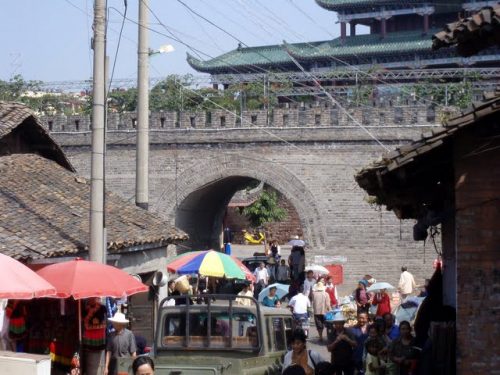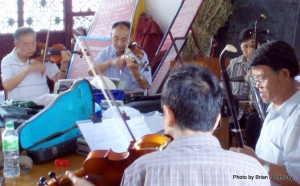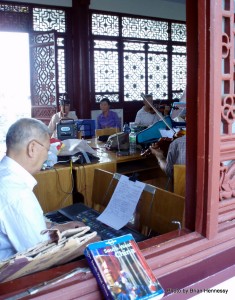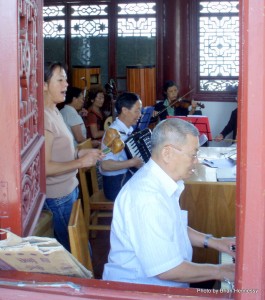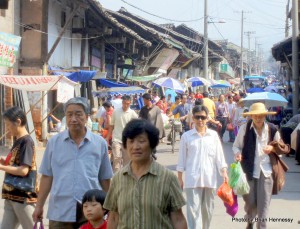In Xichang
Brian Hennessy. An Australian in China. 2007
The first thing I do after arriving in a new town is get my bearings. And as I wander around looking at everything, getting the feel of the place, I often stumble across something really good. In Xichang yesterday, it was the old quarter of town. The original, crowded, dirty, fascinating part of this capital of the Liangshan Yi Automomous Prefecture in southern Sichuan province. It’s a culturally fascinating place: Han Chinese, ethnic Yi people, and moslem Hui folk all rubbing shoulders together.
In Xichang
______________________________________________________________
After strolling around for about an hour, taking photos, smiling to babies and old folk, and pushing my way through a surging mass of humanity in the local markets, I happened across the remnants of the old city wall. Another reminder of just how old Chinese civilisation really is.
The South Gate of this ancient structure looked interesting and well-preserved, so I climbed the steps to the top of the wall with its stone battlements and its view of the surrounding rooflines. These crazy-angled beautiful ancient structures jostling each other for a bit of space and fresh air. And as I was admiring the view and clicking away, I heard music. Traditional Chinese music. Good stuff too.
So I went looking. Past the interesting teahouse occupying the western end of the building, towards the eastern end where I found them. A group of cheerful retired folk playing various traditional instruments, a couple of violins, a piano accordian, and a keyboard. A white-haired, athletic looking conductor running the show. Looked like a miniature Bernstein, he did. Minus the pomposity.
Anyway, as I was peeking through the window and drifting off into my own reverie, this feller spotted me and invited me inside. I was grateful for this chance to get a box seat: “Nimen hao, xiexie. Nimende yinue shi hen hao. Ting nimende yinue, wo ganqing feichang gaoxing.” (Hello everybody, thank you.Your music is very good. When I listen to it, I feel very happy). My effort to speak the lingo is appreciated and I am forgiven for my bad grammar. A little tortured Chinese language can break the ice, open doors, and get you the best seat in the house.
I find a bench beside the man with the keyboard as Bernie motions for attention. A lady with two hollow percussion instruments taps them twice, and suddenly there is a soft plaintive sound coming from the erhu opposite me (the erhu is a Chinese violin, but it is held in position like the western cello. One string only, with the small sound box resting on the players upper thigh. The sound is not as pure as a violin, but it is rich in colour, and identifiably Chinese).
This feller is the 1st erhu. His music is exquisitely sad as he paints his picture. Delicate touches of the brush first, then broader sweeps of colour. A few bars later he is joined by the other erhus, one by one, and then by the violins. Together they blend this collage of musical colour into a rapture of one sound. Unity. Wholeness.
They repeat the refrain with subtle variation. I feel the longing for something lost. Gone. A lovers parting? A longing for one’s homeland? A premonition of impending death? I don’t know. I just feel the longing.
Then the lady at the back sings. And one-by-one, her friends join her. Singing the song. Solo to Chorus in a few soft steps. A light in their eyes, and a sense of something greater than mere music. Lifting themselves off this mortal coil for a few enlightened minutes as the music carries them away somewhere else. A transcendant moment.
In Xichang. In the middle of nowhere. In China.

